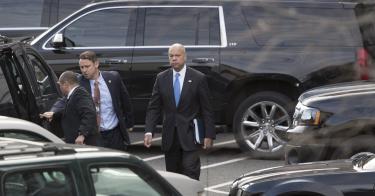Being an informed citizen means keeping up with the news, however tricky it may be to find reliable sources. But sometimes even that’s not enough. It’s easy to get distracted by the latest shouting match and miss some important item that slips by almost unnoticed.
Take Homeland Security Secretary Jeh Johnson’s recent designation of the nation’s state and local election systems as “critical infrastructure.”
Chances are, you didn’t hear about it. And even if you did, you may have shrugged. Sounds pretty unremarkable, right? Surely our election systems deserve to be well-protected, so why complain?
Dig a bit, though, and it starts to look fishy. Go a little deeper, and it starts to look dangerous.
To see why, consider how the current system works. Many Americans probably don’t realize that elections are handled primarily at the state and local level — and we should be glad they are.
“The U.S. has the most decentralized election administration system of any Western democracy,” notes Hans von Spakovsky, a former member of the Federal Election Commission. “Elections are run at the county (and even township) levels, and voting machines are not tied into the internet or a centralized computer system.”
There are 9,000 jurisdictions responsible for vote-counting nationwide. But this decentralization is a good thing. We’ve all heard the rumors of election hacking, either by Russia or others, and one of the reasons it’s such a farfetched fear is that there’s no central control — no one place for anyone to tap in and monkey with the election results.
That’s not to say that other forms of election tampering aren’t possible. Far from it, unfortunately. Voter fraud is a real danger, and many cases have popped up across the country.
But these occur invariably at the state and local level. It would be extraordinarily difficult for anyone, foreign or otherwise, to tap in and tamper with the results on a national level — for the simple reason that there’s no central place to tap.
Designating our election systems “critical infrastructure” places that security in jeopardy.
And for what? As Mr. von Spakovsky notes:
“On Jan. 5, the same day as Jeh Johnson’s conference call [with election officials to inform them of his decision], Director of National Intelligence James Clapper told the Senate Armed Services Committee that there was no Russian hacking of “vote tallies” or any manipulation of voting machines. Indeed, after the Nov. 8 election, Johnson himself admitted that DHS saw no “evidence that hacking by any actor altered the ballot count or any cyber actions that deprived people of voting.”
Elections officials were overwhelmingly opposed to the change. But that didn’t matter, according to Christy McCormick, a commissioner on the U.S. Election Assistance Commission (EAC), the agency charged with being the national clearinghouse and resource for states and local election officials on the best practices and standards in administering elections.
Mr. Johnson, she said, “discarded and dismissed the opinions and concerns of the secretaries [of State] and of the EAC commissioners, the very people who actually have deep professional experience in conducting and administering elections.” His unilateral action “blindsided election officials.”
And no wonder. There’s no denying what this looks like: a blatant move to politicize the election process. After all, Mr. Johnson bypassed the EAC, which was set up by Congress as a bipartisan, independent agency to guard against having elections “handled or governed by a partisan branch of the Federal Government” that is under the control of whatever party occupies the White House.
Mr. Johnson actually denied the move was “a federal takeover.” But that’s exactly what it is. It’s a takeover ostensibly designed to address a nonexistent security threat — and in the process, ironically, make our elections less secure.
Despite all this talk about the Russians hacking us, the real enemy is within. It’s time to expose this naked power grab — and reverse it.
This piece originally appeared in The Washington Times.




